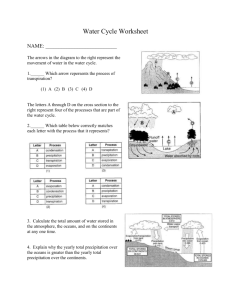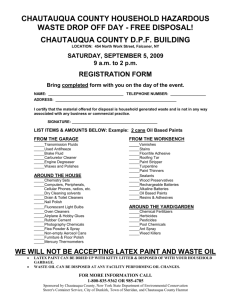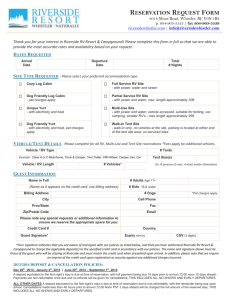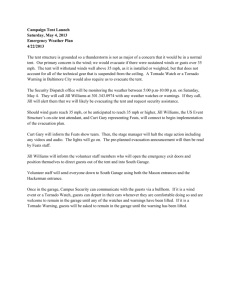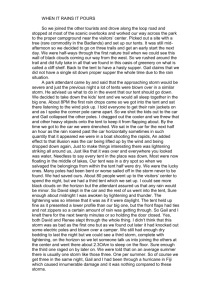Chautauqua Committee Guidelines
advertisement
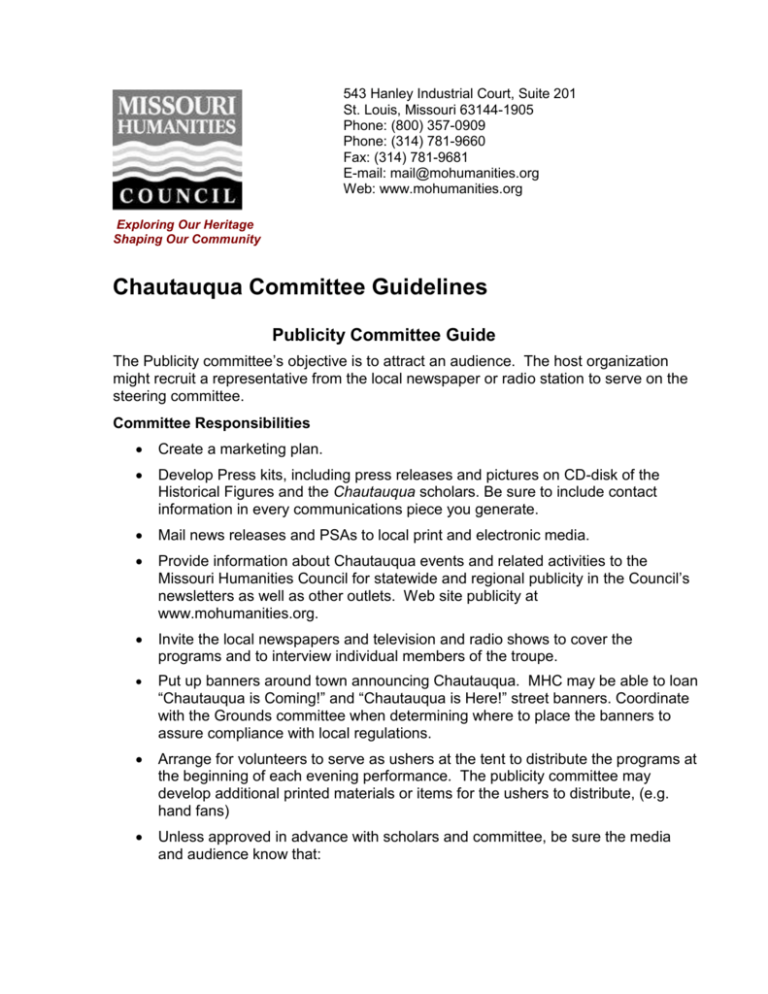
543 Hanley Industrial Court, Suite 201 St. Louis, Missouri 63144-1905 Phone: (800) 357-0909 Phone: (314) 781-9660 Fax: (314) 781-9681 E-mail: mail@mohumanities.org Web: www.mohumanities.org Exploring Our Heritage Shaping Our Community Chautauqua Committee Guidelines Publicity Committee Guide The Publicity committee’s objective is to attract an audience. The host organization might recruit a representative from the local newspaper or radio station to serve on the steering committee. Committee Responsibilities Create a marketing plan. Develop Press kits, including press releases and pictures on CD-disk of the Historical Figures and the Chautauqua scholars. Be sure to include contact information in every communications piece you generate. Mail news releases and PSAs to local print and electronic media. Provide information about Chautauqua events and related activities to the Missouri Humanities Council for statewide and regional publicity in the Council’s newsletters as well as other outlets. Web site publicity at www.mohumanities.org. Invite the local newspapers and television and radio shows to cover the programs and to interview individual members of the troupe. Put up banners around town announcing Chautauqua. MHC may be able to loan “Chautauqua is Coming!” and “Chautauqua is Here!” street banners. Coordinate with the Grounds committee when determining where to place the banners to assure compliance with local regulations. Arrange for volunteers to serve as ushers at the tent to distribute the programs at the beginning of each evening performance. The publicity committee may develop additional printed materials or items for the ushers to distribute, (e.g. hand fans) Unless approved in advance with scholars and committee, be sure the media and audience know that: o No video or sound recordings are allowed other than for TV or Radio News purposes. o Photography during the performance will be allowed provided a flash is not used and the photographer is respectful to the live audience present. Program Committee Guide The Program Committee’s Job The Program committee schedules Daytime Programs, delivered by the Chautauqua troupe members at various organizations around the community. Daytime Programs last 30-45 minutes and are may or may not be substantially different from the evening performances under the tent. That is up to the committee to determine. Daytime Program schedules should be finalized early on so that publicity materials can be produced in time to be effective. The Program committee is also responsible for coordinating drivers to take the speakers to and from each daytime program. Points to Remember When Scheduling Determine whether the scholars programs are suitable for young audiences or designed primarily for adult audiences. Do not schedule scholars for Daytime Programs on the day they are the featured attraction in the evening performance. Media and the rights of the Chautauqua Scholars The Chautauqua scholars have proprietary rights to their lectures, performances, and even their likenesses. If the media are present at Daytime Programs, permission must first be obtained from the scholar before taking pictures, videotaping, filming or making sound recordings. In the event that a media interview is requested at a Daytime Program, please keep the integrity of the program intact. Don’t change the length of the program or its starting time to squeeze in the interview. How to arrange Daytime Programs Make a list of organizations that might be interested in hosting a program. Think about service clubs, libraries, senior centers, churches, state or national parks. You may also consider family and youth organizations such as YMCA, summer school, and summer camps. The Chamber of Commerce may have a list of all the clubs and organizations in the area. Consult your chairperson about each of the Scholar’s availability for programs. Managing Drivers for Daytime Programs Arrange for a driver/escort for each daytime program. Make a master list of all the drivers’ names and phone numbers and designate the scholar/program to which each is assigned. Provide this list to the Chautauqua committee chairperson for reference. Tell each driver to contact his/her scholar in advance to arrange a pick-up time and location (usually the hotel lobby). Drivers may contact the scholars in person at the tent or call them at the hotel. Give each driver (1) the hotel name and phone number; (2) the Daytime Program location, with directions, and phone number; and (3) the contact person for the Daytime Program, and his/her phone number. Suggestions: Being a Driver/Escort is an easy way for the community members to volunteer their help. The more people involved in Chautauqua the better! Drivers also benefit by hearing great Daytime Programs. There are several options for finding drivers. You can arrange for a different person to drive to/from each program. If this is too many people to manage, consider a corps of drivers who are able to cover all the programs or assign one driver to each scholar. Another option is to request that a member of the organization to whom the scholar will speak serve as the Driver/Escort. Information for the host sites of Daytime Programs The person who initiated the program at his or her location should be present during the program. Water should be made available to the scholar. If a sound system is necessary, it should be set up and ready to go before the scholar’s arrival. This is particularly important if there are over 20 people present. Someone at the location should be designated in advance to introduce the scholar. Ask the scholar, in advance, to provide a short introduction that can be read. Grounds Committee Guide Overview of the Grounds Committee’s Job More than any other committee, the Grounds Committee’s work affects the community’s chance of having a wonderful time at Chautauqua. This committee is responsible for: Providing Public safety before, during, and after the shows. Securing any special certificates, licenses, or insurance required by the town for the tent, if using a tent, or any other aspects of the event. Additional responsibilities for sites using tents include: Securing a good tent site with easy access to electrical service, convenient parking and toilet facilities. Providing security for the site and equipment. Recruiting people to raise and strike the tent (if applicable). Parking Arrange for parking sites (roped off streets and distance parking with shuttles if necessary). Golf carts are helpful for transporting the elderly and disabled if the grounds are uneven. Mark entrance and exit routes for cars. Provide parking attendants with adequate means of control such as flashlights or flags and walkie-talkies. Identify parking attendants with hats or brightly colored vests. Emergency and medical services Arrange for emergency medical service and first aid on site during each evening program. Secure a certified Fire Extinguisher to remain on site Develop an Evacuation plan Food and beverage concessions Locate the placement of any food and beverage concessions where people have easy access. Determine electrical needs of the concessionaires and arrange for this additional electrical service. The tent site and an alternative rain site Select a large, easily accessible, open space, like a public park, with firm grass turf, near public restrooms and protected from wind. Measure for the tent dimensions. This space needs to be level. Make sure the site for the tent works in all three dimensions—length, width, and height. Clearly mark any buried gas or electric pipe or cable in the vicinity of the tent to assure that no tent stakes will be driven into the ground in that area. Arrange for an alternate indoor site for evening programs in case weather conditions prohibit the use of the tent. Assign a committee member to monitor weather forecasts and to consult with Chautauqua committee chairperson if conditions may require use of the rain site. If volunteers will put up the tent, arrange for groups or organizations to help raise the tent AND strike it after the final show. Good sources of people-power are Boy Scouts, Girl Scouts, 4-H, and service organizations such as Rotary or Lions. Ask anyone who owns a sledge hammer to bring it. The more sledge hammers, the faster the tent goes up! Electrical Requirements Determine electrical service needs for the program site. The lighting and sound equipment draw a lot of electrical power, vital components of the show. The local power company can run an aerial cable from a power pole to a temporary distribution box or board near the tent. MHC used the following specifications for electrical service: o Exclusive use of 4 separate circuits, each circuit with a minimum of 20 amps of “clean power” that can maintain between 120 to 115 volts under load. o Each circuit must have two outlets, located within 25 feet of the tent, which will accommodate a grounded, three-prong, male plug. Security Notify police and fire department well in advance of the planned events, and arrange for a police patrol of the tent site at night. Arrange for overnight watch people: one or more local people have to be present at the tent site and responsible for its security from the end of each show, including the tent-raising, until sunrise the following day. Sanitary facilities and grounds cleanup Arrange for existing restrooms at the tent site to be open, stocked, clean and in working order each night OR arrange for portable toilets and select a location that is convenient and upwind of the tent and concessions. Arrange for trash receptacles at the tent site, and for volunteers to empty them and to pick up debris on the grounds. Fundraising Committee Guide The fundraising committee generates the funds to cover the expenses associated with Chautauqua. This committee can also coordinate activities that acknowledge donors and reinforce friendships. The Committee should be clear about their fundraising goals based on the Chautauqua budget, and develop a plan to raise the funds necessary to cover the expenses of the planned events. Private and Commercial Donors Food concessions The Committee may set up food and beverage concessions as a means of generating revenue or the Committee may allow a local charity to operate a food and beverage concession stand at the site. Concessions should cease operations when the scholar’s portion of the program begins. (The location of any concession stand should be coordinated with the Grounds Committee.) Donor recognition Donor recognition is an important part of fundraising. Special Events can generate both funds and friends. You may want to consider forming a Donor Recognition Sub-Committee to organize a reception to honor your donors and other friends of the Chautauqua. These events work very well in private homes or at a location such as a County Club where the public does not have access. “In-Kind” donations Consider requests to local motels for B&Bs to provide lodging at no charge or reduced fee. Provide troupe meals. Solicit gift certificates from area restaurants; provide vouchers for each troupe member to use for free food from the concessions/meal service each evening at the tent site; create a “Take-AScholar-to-Lunch” program encouraging participation of individuals and/or businesses. An important responsibility of the Fundraising Committee is tracking all donations and gifts. You may want to recruit a Sub-committee to track cash and in-kind (i.e., non-cash) contributions of goods and services to the project. Suggestions for “Giving” Categories for your local sponsors: Underwrite “A Day of Chautauqua” (includes Daytime Programs and Evening Tent Events) $3000 Underwrite “An Evening of Chautauqua” (includes Musical Entertainment and Scholar’s Presentation) $2000 Underwrite a picnic supper for Tent Raising Volunteers $1000 Underwrite “Tent Raising” to include picnic and musical entertainment for Chautauqua Troupe plus 100+ community volunteers “Name on the Stage” for the week All tent events will be billed as taking place on the “(name of sponsor) stage” e.g. “The U.S. Bank stage” $1500 $3000 These are guidelines and suggested giving levels which may be modified to meet the needs of your Development Plan. An important task will be for your committee to determine at what giving level sponsors will be acknowledged in the Program and through other means. They may also be acknowledged in press releases (if known at the print deadline), in the emcee’s remarks each evening and additional publicity as determined by the local committee. Logos may be used on print materials if space allows. Each sponsor may also provide a banner which will be displayed at the tent on the appropriate evening(s). Alternate suggestions for recognizing your sponsors would be to create a donor board that could be erected at the tent site. If you have a long list of donors, you might consider printing an insert for the program. Entertainment Committee Guide The entertainment committee recruits local talent to “warm up” the Chautauqua crowd before each evening’s main performance. If “raising” a tent, entertainment afterwards always makes for a nice evening for the volunteers, especially if food is being served. Recommended length of Entertainment program: 30 minutes Schedule entertainment to end at least 15 minutes prior to the scholar’s portion of the program in order to re-set the stage. Confirm lighting and sound needs of entertainment prior to the event. The Entertainment Committee should work with the Grounds Committee if an additional power supply is needed for the entertainers. Designate someone each evening responsible for giving the performers a “two-minute warning” to assure that they don’t run over and delay the scholar’s presentation. Sound Equipment Determine the equipment needed for presentations. In past years, MHC has used: o 4 Handheld wireless microphones o 3 boom-style microphone stands o CD/Tape player o FOH mixing console o Speakers to augment stage sound both inside and outside of the tent Let entertainers know if they are expected to provide additional sound equipment as needed. Make it clear when arranging for entertainment that the Chautauqua sound system is limited and may not be adequate to cover all of their needs. Masters of Ceremonies An emcee may be engaged to make announcements before each evening’s performance. Recommendations include: State and Federal Legislators, Mayors, or other elected officials who are often gratified by the opportunity to mingle with the crowd and introduce the program. Representatives of surrounding towns—if multiple towns are involved in Chautauqua events, arrange for an emcee from each town. Sponsors or representatives from donating organizations/foundations who may appreciate the opportunity for recognition.
